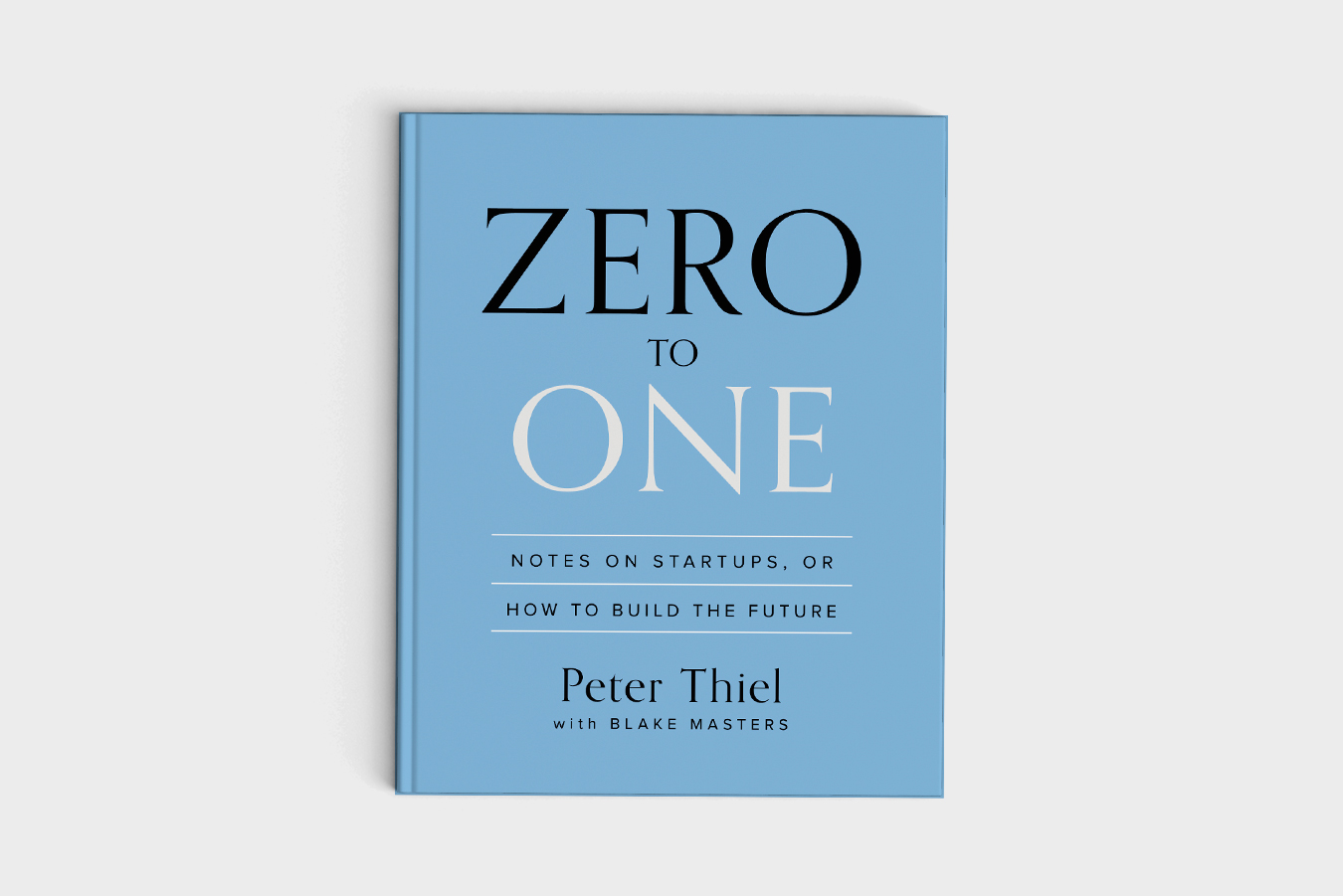There are a few books that I consider must-read for anyone working on products. Today I’ll be talking about my favourite ideas from Peter Thiel’s iconic book Zero to One: Notes on Startups, or How to Build the Future
Here’s what the scholar Nassim Taleb has to say about Zero to One: “When a risk taker writes a book, read it. In the case of Peter Thiel, read it twice. Or, to be safe, three times. This is a classic.”
Taleb’s remark on Zero to One surprised me. And here is why.
At this point, I was already familiar with a few books written by Nassim Taleb. I had also read (for a few times) Thiel’s class notes that later became the manuscript for Zero to One. I really liked the harmony and sequence of thoughts in each of these books, but at the same time for me the perspectives on life of the authors seemed rather opposite.
One way or another, Zero to One is beyond amazing. I enjoy re-reading it every once in a while, and each time I find something new. And this is exactly what sets aside great books from good ones.
→ Test your product management and data skills with this free Growth Skills Assessment Test.
→ Learn data-driven product management in Simulator by GoPractice.
→ Learn growth and realize the maximum potential of your product in Product Growth Simulator.
→ Learn to apply generative AI to create products and automate processes in Generative AI for Product Managers – Mini Simulator.
→ Learn AI/ML through practice by completing four projects around the most common AI problems in AI/ML Simulator for Product Managers.

My favorite quotes from Zero to One
I decided to share some of my favourite quotes from the book, which has become one of my favorites. I think these are the things that struck me as most relevant, and the ones that were my main takeaway from the book. I hope for those of you who haven’t had a chance to read Zero to One yet, the following will change your mind.
Any new and better way of doing things is technology.
What important truth do very few people agree with you on?
Humans are distinguished from other species by our ability to work miracles. We call these miracles technology. Technology is miraculous because it allows us to do more with less.
1. It is better to risk boldness than triviality.
2. A bad plan is better than no plan.
3. Competitive markets destroy profits.
4. Sales matters just as much as product.Startups operate on the principle that you need to work with other people to get stuff done, but you also need to stay small enough so that you actually can. Positively defined, a startup is the largest group of people you can convince of a plan to build a different future.
Every firm in a competitive market is undifferentiated and sells the same homogeneous products.
Rivalry causes us to overemphasize old opportunities and slavishly copy what has worked in the past.
As a good rule of thumb, proprietary technology must be at least 10 times better than its closest substitute in some important dimension to lead to a real monopolistic advantage. Anything less than an order of magnitude better will probably be perceived as a marginal improvement and will be hard to sell, especially in an already crowded market.
Every monopoly is unique, but they usually share some combination of the following characteristics: proprietary technology, network effects, economies of scale, and branding.
Sequencing markets correctly is underrated, and it takes discipline to expand gradually. The most successful companies make the core progression—to first dominate a specific niche and then scale to adjacent markets—a part of their founding narrative.
Every startup is small at the start. Every monopoly dominates a large share of its market. Therefore, every startup should start with a very small market.
Always err on the side of starting too small. The reason is simple: it’s easier to dominate a small market than a large one. Small doesn’t mean nonexistent.
The perfect target market for a startup is a small group of particular people concentrated together and served by few or no competitors.
If you think of yourself as an insurgent battling dark forces, it’s easy to become unduly fixated on the obstacles in your path. But if you truly want to make something new, the act of creation is far more important than the old industries that might not like what you create. Indeed, if your company can be summed up by its opposition to already existing firms, it can’t be completely new and it’s probably not going to become a monopoly.
We didn’t try to directly challenge any large competitor. It’s true that we took some business away from Visa when we popularized internet payments: you might use PayPal to buy something online instead of using your Visa card to buy it in a store. But since we expanded the market for payments overall, we gave Visa far more business than we took.
In an indefinite world, people actually prefer unlimited optionality; money is more valuable than anything you could possibly do with it. Only in a definite future is money a means to an end, not the end itself.
Founders only sell (their company) when they have no more concrete visions for the company, in which case the acquirer probably overpaid.
The power law—so named because exponential equations describe severely unequal distributions—is the law of the universe. It defines our surroundings so completely that we usually don’t even see it.
In venture capital, where investors try to profit from exponential growth in early-stage companies, a few companies attain exponentially greater value than all others.
Even the best venture investors have a portfolio, but investors who understand the power law make as few investments as possible. The kind of portfolio thinking embraced by both folk wisdom and financial convention, by contrast, regards diversified betting as a source of strength.
“It doesn’t matter what you do, as long as you do it well.” That is completely false. It does matter what you do. You should focus relentlessly on something you’re good at doing, but before that you must think hard about whether it will be valuable in the future.”
The most important things are singular: One market will probably be better than all others, as we discussed in Chapter 5. One distribution strategy usually dominates all others, too.
A world without secrets would enjoy a perfect understanding of justice.
There are two kinds of secrets: secrets of nature and secrets about people.
Every great company is unique, but there are a few things that every business must get right at the beginning. I stress this so often that friends have teasingly nicknamed it “Thiel’s law”: a startup messed up at its foundation cannot be fixed.Bad decisions made early on—if you choose the wrong partners or hire the wrong people, for example—are very hard to correct after they are made. It may take a crisis on the order of bankruptcy before anybody will even try to correct them. As a founder, your first job is to get the first things right, because you cannot build a great company on a flawed foundation.
However, anyone who doesn’t own stock options or draw a regular salary from your company is fundamentally misaligned.
Even Though Sales is everywhere, most people underrate its importance. Silicon Valley underrates it more than most.
That’s true (when a weaker product takes over the market), but it doesn’t mean the operating systems we use today and the keyboard layouts on which we type were imposed by mere chance. It’s better to think of distribution as something essential to the design of your product. If you’ve invented something new but you haven’t invented an effective way to sell it, you have a bad business—no matter how good the product.
Superior sales and distribution by itself can create a monopoly, even with no product differentiation. The converse is not true. No matter how strong your product—even if it easily fits into already established habits and anybody who tries it likes it immediately—you must still support it with a strong distribution plan.
Most businesses get zero distribution channels to work: poor sales rather than bad product is the most common cause of failure. If you can get just one distribution channel to work, you have a great business. If you try for several but don’t nail one, you’re finished.
Most … companies crashed because they neglected one or more of the seven questions that every business must answer:
The Engineering Question “Can you create breakthrough technology instead of incremental improvements?”
The Timing Question “Is now the right time to start your particular business?”
The Monopoly Question “Are you starting with a big share of a small market?”
The People Question “Do you have the right team?”
The Distribution Question “Do you have a way to not just create but deliver your product?”
The Durability Question “Will your market position be defensible 10 and 20 years into the future?”
The Secret Question “Have you identified a unique opportunity that others don’t see?”As a good rule of thumb, proprietary technology must be at least 10 times better than its closest substitute in some important dimension to lead to a real monopolistic advantage.
Entering a slow-moving market can be a good strategy, but only if you have a definite and realistic plan to take it over.
Every entrepreneur should plan to be the last mover in her particular market. That starts with asking yourself: what will the world look like 10 and 20 years from now, and how will my business fit in?
Doing something different is what’s truly good for society—and it’s also what allows a business to profit by monopolizing a new market.
Apple’s value crucially depended on the singular vision of a particular person. This hints at the strange way in which the companies that create new technology often resemble feudal monarchies rather than organizations that are supposedly more “modern.”
A unique founder can make authoritative decisions, inspire strong personal loyalty, and plan ahead for decades. Paradoxically, impersonal bureaucracies staffed by trained professionals can last longer than any lifetime, but they usually act with short time horizons.
Founders are important not because they are the only ones whose work has value, but rather because a great founder can bring out the best work from everybody at his company.
→ Test your product management and data skills with this free Growth Skills Assessment Test.
→ Learn data-driven product management in Simulator by GoPractice.
→ Learn growth and realize the maximum potential of your product in Product Growth Simulator.
→ Learn to apply generative AI to create products and automate processes in Generative AI for Product Managers – Mini Simulator.
→ Learn AI/ML through practice by completing four projects around the most common AI problems in AI/ML Simulator for Product Managers.






